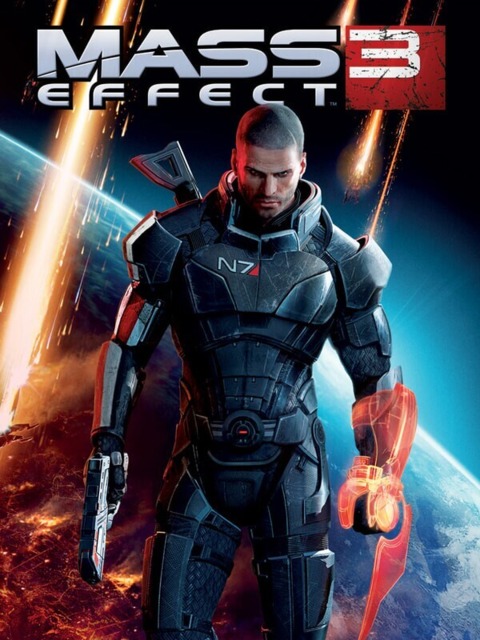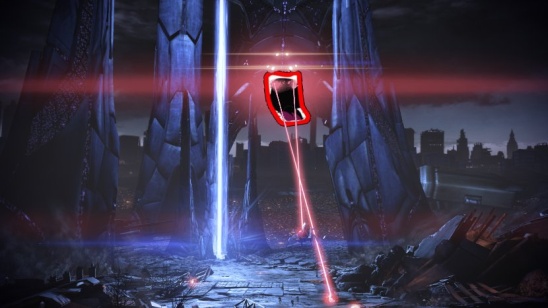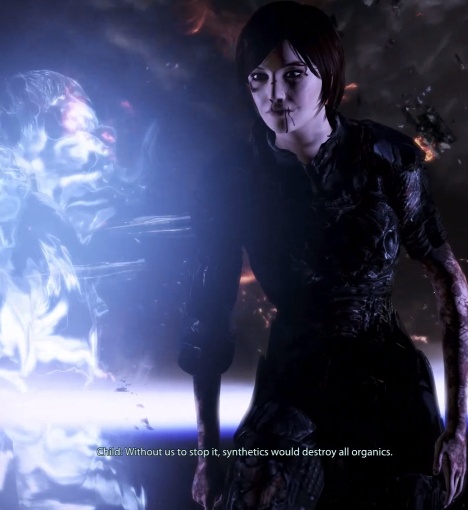@onan said:
@TheHT said:
When did I say anything about a created vs. creator theme? Though that technically exists throughout with all the quarian-geth relations and in ME2 with all the family business, it's not same as synthetics vs. organics. I don't see what makes synthetics vs. organics "one of those meaningless" themes. What makes a theme meaningful and what makes it meaningless? Whether you've recognized it or not? How terribly arbitrary.
Yes, synthetics revering advanced synthetics as gods. You also learn about the quarians and the geth. You learn about how that event shaped galactic law. You learn about their existence shaped Saren's belief that organics could be spared from the harvest. You learn that when the Reapers, no longer having access to the keepers (which they used for millions of years), lost their ace in the hole, the geth (who went to the Reapers) fortuitously compensated for that loss. How could they then have been replaced by the flood and not had an impact on the story?
I don't see how the geth in Mass Effect 1 are 'fodder'. Husks are fodder. Lowly geth troopers are fodder. Standard Cerberus troopers are fodder. The entirety of the geth in Mass Effect 1 are not fodder just like the entirety of the Reaper forces in Mass Effect 3 are not fodder, despite the fodderest of fodder (husks) belonging to that faction.
Try not to overlook the fact that the mere existence of thee geth is not all there is to the theme of synthetics vs. organics. The Mass Effect series is large and deals with lots of things in multiple ways.
What's this about Old Ones? The Reapers were known to be synthetic in Mass Effect 1. Before that, Sovereign was thought to be just a ship. The cycle of harvest was explained in Mass Effect 1. Have you forgotten your talk with Sovereign? Have you forgotten your talk with Vigil?
Replace the geth with something completely different you set of a chain reaction that alters all of the Mass Effect series. You haven't shown how replaced the geth with something else deals with all of these repercussions in ways that result in the same series, nor have you shown how replacing the Reapers or any other synthetic still somehow manages to keep things the same.
@onan said:
Mass Effect 3 had almost nothing to do with synthetics up until Priority: Rannoch. Taken separately, yes, the theme there is the struggle between organics and synthetics, between Created and Creators. It is honestly the ONLY POINT IN THE SERIES that even remotely supports any of what mentioned in the 11th hour exposition dump from the Catalyst. Even then, in the paragon conclusion to the battle, the Paragon themes of unity contradict directly contradict what the Catalyst says.
I was responding to this, but you're right, 'disprove' was too strong a word. Nonetheless, as I did say, what happens on Rannoch in that paragon ending contradicts nothing.
Oh my mistake, you meant synthetics destroying organics was a theme, like the catalyst summarized.
Not "created rebelling against creator." Man, where did I get that poppycock from?
No idea. But weird how one thing he says is meaningful and the other is meaningless. How terribly arbitrary.
Incidentally, the Geth could have been replaced by just a bunch more cloned krogan or rachni and ME1 would have played out almost exactly the same. Or the Flood, or storm troopers. Just more things to shoot. I didn't think it needed explanation because the explanation would be something along the lines of "and nothing happened" because nothing happened with the Geth. Seriously, I don't know how I can explain it more clearly, the Geth do NOTHING in ME1 other than shoot at you. Saren and Sovereign even referred to them as tools. Pretty sure they never even spoke, just electronic growling. Their status as synthetic beings wasn't exploited for plot purposes, they may as well have been feral. The Quarians were a complete non-event in ME1, Tali being an oddity, a unique alien on your ship, serving as a cautionary tale that in this fiction, they were going to avoid using AIs because they open themselves up to too much potential story abuse, much like Battlestar ships used fuel and didn't have teleporters. The Morning War was interesting backstory, but so were the Krogan Rebellions, the First Contact War, the Skyllian Blitz, the Rachni Wars, etc. The geth/quarian conflict was an interesting side thing and didn't factor into the main plot. The fact that you're fighting robots in a sci-fi game is inconsequential because you're fighting robots in a sci-fi game. Yes, it's a tautology, but that's just how sci-fi rolls. Robots are easy enemies. You don't have to explain where they're coming from, or what their motivations are. They're robots programmed to kill you and you should stop worrying about logistics and enjoy the rest of the story.
But hey, let's bring it forward. Convert the Quarian/Geth conflict with the Romulan/Reman conflict, instead of synthetics, it could be a subjugated slave race ejecting their masters from the planet and everything else would be the same except you'd be pointing your gun at things that weren't shiny metal. It wouldn't have changed the Reapers actions. Mass Effect 1 and 2 would have been almost identical, except for the Heretic Base mission. Priority Rannoch would have played out differently. Although honestly, the entire quarian/geth conflict, to me at least, felt like a sci-fi slavery allegory from the moment Legion opened his mouth. (figuratively speaking.)
It's honestly not the story's fault. They had no idea where they were going with this series and it completely shows. Retroactively applying themes with the tiniest bits of connective tissue don't really work. Just look at what happened to Cerberus. In the first game they were a minor terrorist organization, while in ME2 they were large enough and well-funded enough to put the Alliance to shame, along with with completely reworked values, becoming misunderstood heroes with a questionable leader. Seriously, they were something like al Queda in the first game, and then in the second game, they're not only able to easily fund the creation of a next generation prototype F-22 Raptor (A plane cost taxpayers $28 billion to develop and build and that's the planes that aren't classified), they're capable of improving on a joint Turian/human technological venture to such a degree that it dwarfs the original in terms of firepower and scope, and they're STILL not hurting for cash, best in class personnel, they have everything.
Anyway, we're getting into really subjective territory now so there's no point continuing this conversation. Especially since we can't even agree on what themes are spelled out for the player at the end of the game.
No, not arbitrary. Your mistake was thinking I was getting the theme from the last 10 minutes. And I never said anything about themes of synthetics destroying organics. Synthetics vs. organics. Their relationship. How they compare and contrast, where they align and clash, in this world. If you had read my posts in their entirety you should have figured the 'vs.' wasn't simply a synonym for 'fighting' and even if you did, that's not the same as destruction. And none of all that is the same as a theme of creator vs. created. So yeah, I don't know where you got that poppycock from either. Wasn't from me.
Hm? What's this about sci-fi and robots? You're not being serious are you? That's actually kinda funny. And I thought your sense of humour was merely reliant on scouring the internet for 'funny' images and videos.
Anyways, you're just repeating yourself without taking into account where I refute your claims. Particularly:
Yes, synthetics revering advanced synthetics as gods. You also learn about the quarians and the geth. You learn about how that event shaped galactic law. You learn about their existence shaped Saren's belief that organics could be spared from the harvest. You learn that when the Reapers, no longer having access to the keepers (which they used for millions of years), lost their ace in the hole, the geth (who went to the Reapers) fortuitously compensated for that loss.
None of that would happen as it did with romulans. Or remans. Whichever is meant to be the geth analog. But first some corrections. Apparently Sovereign approached the geth, the thought being that controlling synthetics is easier than controlling organics. So the geth did not seek out Sovereign. Coincidentally, this works in favour of my argument.
There wouldn't be any brash decision to kill their creations when they got too smart (which would end up affecting quarian mentality towards synthetics as well as other aspects of their society). There wouldn't be any outlawing of artificial intelligence. There wouldn't be a group of geth who worship Reapers as the apex of synthetic being who would then be approached by Sovereign because they were synthetic and made into its army. Sovereign wouldn't then use the geth to muscle their way to an alternative means of bringing the Reapers from dark space as well as a tool for preparing for their coming. Saren wouldn't then be inspired by the geth to prove that organics could be put to use by the Reapers, and spared from destruction. And that's only the things from Mass Effect 1. The geth are important and can't just be replaced with romulans or remans.
Also, before I forget, you've yet to explain how replacing other synthetics would work. Other synthetics like, you know, the Reapers.
I don't agree with the slavery allegory, but I see how you could make that connection, and it's definitely an interesting one.
The theme was there in the first game, and they only built upon it in the later games. The same goes for Cerberus. They were just some shadowy extreme pro-human xenophobic terrorist organization. In Mass Effect 2, they're the ones that save your ass, and your experience with them is all in line with the little you know of them from Mass Effect 1. I don't see where they would fit in elsewhere in the first game. You're an alliance soldier, the first human spectre, on some serious spectre business that has nothing to do with them. They only really enter the fray in Mass Effect 2. Just because you don't see much of them doesn't mean they're insignificant in the game universe at that point.
@Tennmuerti said:
@TheHT said:
The Crucible's power isn't that of godhood. Well, again, unless someone's measure of godhood is anything beyond nanomachines
At this point you are deliberately and actively ignoring the points I have made. (and reading further you are continuing to ignore them just as frequently and twisting others)
Nor do you even begin to grasp either the sheer ludicrous amount of power, technology, precision levels that a required to perform something akin to the green ending.
Likewise I see you completely missed the entire point being made as to why such sheer capability is bad, such all solving deus ex machina.
I don't mind arguing and doing the mental dance, but when I can clearly see the person i'm arguing with is simply ignoring what I said, or in other cases twisting what I said it's no longer a debate, there are only 2 predominantly possible explanations for this either a it is done very deliberaetly like this by a smart person who will just continue to misinterpret everythig on purpose to twist every which way , or it's all just going over your head, like a /woosh.
Why would the Reapers or the Citadel be full of human DNA?
Here I'm starting to suspect the second explanation.
The Crucible obviously affects synthetic life-forms only.
And here. Therefore I don't see a point in arguing further. Sorry.
Curious. What did I twist? I assure you, I'm not responding maliciously.
My point is that measures of godhood are constantly being pushed back. Fire, atom-splitting, faster-than-light travel, creating synthetic life. At some point all of these things were seen as being near godhood, but the advancements life-forms contineu to make continue to never really reach the power of gods. The Crucible is no different here. All that changes for these things to stop being considered magic is your frame of reference. Just so, the Crucible is just another piece of technology, not something that's actually close to omnipotence.
There's something I failed to mention in my earlier response: the process of synthesis doesn't occur simultaneously across the galaxy.
As for what's required for the Crucible to work, I've already said I wouldn't get into the nitty gritty of the Crucible. We simply don't know enough about it, let alone the Citadel and mass relay system it makes use of, to make claims about the specifics of its engineering.
I don't see what the problem is with my questions. You made a statement:
@Tennmuerti said:
If Shepard sacrifices himself/herself the resulting amalgamation extends the Crucible's reach to organics too, and repeats that combination for all organics and synthetics.
Simple. That minor addition to the Crucible's energy changed it.
Nice lets change what is effectively an EMP distribution device or a viral distribution device into something that can alter matter at whim instantly on billions of stars, with pretty much disregard for basic physical laws such as energy conservation principles.
Just add some DNA to the beam, simple. Woooooo!(not that the Reapers themselves aren't full of human DNA already or even the Citadel itself) (If you are going to argue that the Crucible+Catalyst are not emp/viral device and could already alter matter, then sorry DNA addition is bollocks, it's un needed, matter manipulation on cellular level to all flora, founa, bacteria etc hinges on an near infinite amount of varied DNA, and basic samples are in any random bacteria) Now lets take off our pants, get some acid and start tripping balls! /facepalm OH COME ON!
And I asked for clarification.
Or is that what you consider twisting words? Pointing out peculiar things you say and asking for clarification? Well that would be peculiar in and of itself. If that's the case then if you ever meet a sophist, I suggest you run. They'll melt your tender mind.




Log in to comment